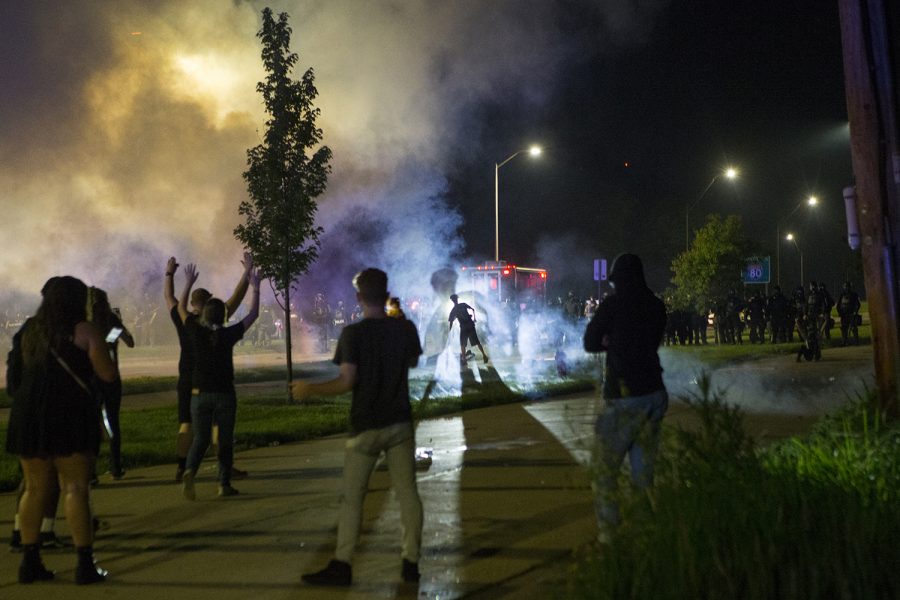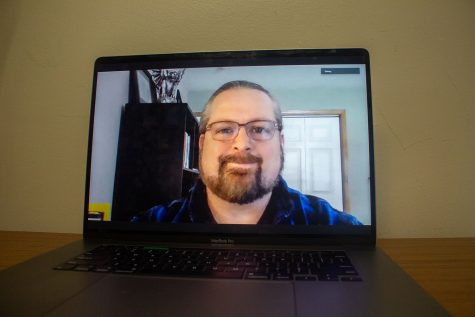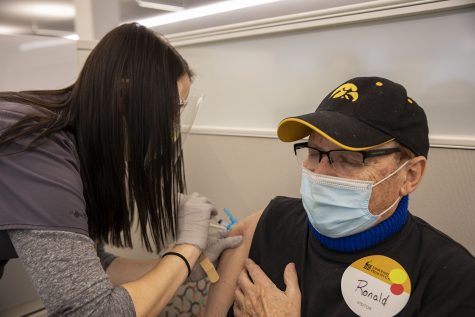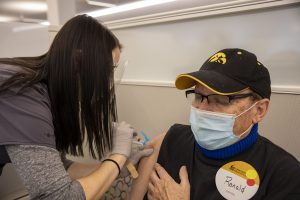Protesters question thoroughness of June 3 protest review
Several people who participated in summer protests said during a city council meeting that an independent review of the June 3 protest didn’t represent protester voices.
A protester puts their bicycle on the ground before sitting down in front of police officers. Officers fired tear gas on the crowd after protesters attempted to advance on the police line. Several protesters reported that no one in the crowd made physical contact with officers before being tear gassed. This protester sat on the ground amid a cloud of tear gas for several minutes.
February 3, 2021
People who were active in summer protests voiced their discontent Tuesday with an independent review of the incidents of a protest on June 3, when the Iowa City Police Department and Iowa State Patrol deployed tear gas and flash-bangs on peaceful protestors.
Some supporters and members of the Iowa Freedom Riders and other Iowa City community members said during the Iowa City City Council’s Tuesday meeting that the report painted the police departments in a positive light and didn’t adequately represent protester voices.
The Iowa Freedom Riders was the group that led the summer protests against police brutality, and their demands led to the passage of a 17-point resolution in June which included a commitment to undertake a review of June 3.
The OIR Group, which is based out of Playa del Rey, California, was hired by Iowa City to conduct an independent review of the protest that occurred on June 3, 2020. The city council approved the review in September.
As The Daily Iowan previously reported, the report made several recommendations of the Iowa City Police Department, including clarifying policies and engagements with other law enforcement, increasing officer training, and expanding community outreach.
The report featured interviews with several members of the Iowa City Police Department and city officials, as well as two protesters who filed formal complaints with the Community Police Review Board.
The report was released on Jan. 28. During a work session on Tuesday, the city council decided to discuss the report at their next work session on Feb. 16, due to a lack of adequate time during the current work session.
Several people who participated in the summer’s protests and supporters of the Iowa Freedom Riders critiqued the report during public comment period of the city council meeting on Tuesday, saying the group and Fruin did not take their comments into consideration.
Iowa City resident and Iowa Freedom Riders supporter David Drustrup said he does not trust the independent report and that he thinks Fruin is inappropriately siding with law enforcement which in turn makes the report biased and tainted.
“He commissioned this report, which made dozens of statements about IFR, but didn’t even ask to interview any of us, not one of us,” Drustrup said. “Meanwhile the opinions of several police officers are valued and uplifted.”
Fruin told the DI he wanted to wait until the council had discussed the report before he commented on it.
Iowa Freedom Riders member Emilia Roberts said during public comment that she believes Fruin is going to use the OIR Group report to increase the department’s budget and is choosing to ignore community input and feedback regarding the June 3 protest, as well as with future community policing endeavors.
“The OIR completely disregarded the vast majority who were the clear victims of police brutality,” she said. “Their perspectives should have been centered and not silenced.”
Along with Roberts, several people focused on the fact that the OIR Group report included only two testimonies from protesters who were victims of the June 3 protest, something they said was unacceptable.
“The report literally contains no accounting of any of the physical and mental trauma that the police inflicted upon protesters that night,” Iowa Freedom Riders member Raneem Hamad said. “Again, this is an erasure of Black voices and BIPOC voices that we have been addressing this whole past summer…the victims of June 3 were not included in the discussion at all.”
Attorney Michael Gennaco from OIR Group wrote in an email to the DI that OIR Group approached the assignment based on the request from the City, which was to assess the response of law enforcement to protest activity on June 3.
Gennaco wrote that in order to obtain protesters’ accounts of what happened on June 3, OIR Group also contacted individuals who had made formal complaints with the City, and only two replied.
“Five protestors made complaints, we reached out to all of them and two responded,” Gennaco wrote. “As we indicated in our report, the perspectives those individuals provided to us were helpful.”
In addition to listening to these individual recounts, Gennaco wrote that OIR Group independently researched social media posts and articles written by protesters and community advocates pertaining to the events of June 3.
Gennaco wrote that OIR Group also researched the concerns voiced at city council meetings along with communications sent directly to the City of Iowa City.
“It is also important to note that we had hours of body worn camera, media footage, cell phone footage, and other communications available in order to form our opinions on what occurred on June 3,” Gennaco wrote. “We felt confident that the available information gave us a strong foundation to address the events of June 3, which were the primary focus of our assignment.”
Gennaco wrote that although OIR Group is optimistic in its review, the group remains interested in the community’s response to the issues focused on in the report and whether advocates believe there were additional issues not addressed within the report.
City Councilor Laura Bergus said in an interview with the DI she recognized that there were several valid concerns regarding the OIR review that were presented to the council during the formal meeting on Feb. 2.
Bergus said that the firm reached out to five victims from the event, whereas only two responded. She said that she is unaware of the number of law enforcement officers or city representatives the firm contacted and or spoke with, but she was not one of them.
“I think to the extent that we’re hearing some criticism tonight it was focusing so much on what the police thought or what they said about what happened,” Bergus said. “I appreciate that in terms of the people who were impacted didn’t have much of a voice in that report. I think that’s an understandable concern as far as the lens or the orientation of the report, but it was intended to be about the police and the police response, and to provide recommendations directly relating to police.”
City Councilor Janice Weiner said in an interview with the DI that she found the OIR report to be well detailed and provide critical, constructive recommendations on how to avoid events like those that unfolded on June 3, where tear gas and flashbangs were deployed against protesters.
“I suppose people [read the review] with different expectations,” Weiner said. “My expectation was that we hired OIR to take an in-depth look at what our police department did, how they handled it, how they should have handled it, and what they need to change so that something like this never ever repeats itself. My reaction after reading the report was that while it gave compliments to certain people on the whole, it was actually quite critical of the response.”
Weiner said the public comments made during the meeting that targeted Fruin and the council weren’t constructive, and she said they’re not the best way to make progressive changes within the community.
“I don’t think no matter how frustrated people are in various ways, I don’t think that we make progress by vilifying people,” Weiner said.




















